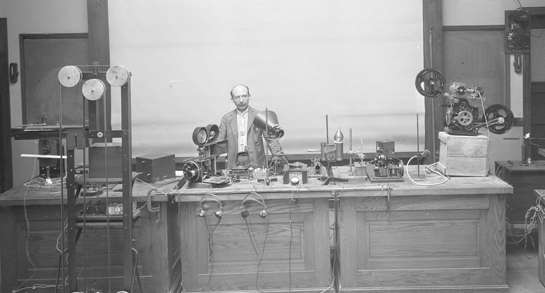Joseph Tykociner with the equipment he developed for sound-on-film movies at the University of Illinois in 1922. Credit: University of Illinois at Urbana-Champaign
Today in 1922, an Illinois professor showed how movies could talk.
Electrical and Computer Engineering professor Joseph Tykociner had given several private demonstrations of his inventions, but on June 9, 1922, he gave his first public lecture and demonstration of his sound on film apparatus. A film of his demonstration was one of the first to successfully incorporate sound.
According to a 2016 article from WILL, Tykociner devised one of the first optical sound tracks—in which sound is converted to a light pattern on motion picture film—so it can be played back in sync with the movie.
This film of the demonstration, courtesy of University of Illinois Archives, shows his wife Helena uttering the first sounds ever heard in a motion picture, "I will ring," followed by the sounds of the bell. Ellery Paine, the head of electrical engineering at Illinois at the time, recites the Gettysburg Address and School of Music faculty member Manoah Leide plays the violin. The film also shows pictures of the soundtrack and how it is affected by speech, the ringing of a bell and the violin.
The original sound has been restored thanks to a grant from National Film Preservation Foundation to preserve the motion picture film elements and potentially restore unknown sound elements from Tykociner's experiments. Being the first attempt at restoration, the preservation of the film by the University Library's Media Preservation Program, led by Joshua Harris, continues to be an ongoing research project to decode the original audio from Tykociner's sound on film demonstration.
According to University of Illinois Archives, although the demonstration film attracted great deal of attention for Tykociner, even the New York World celebrated the invention by publishing his article in which he proclaims, "no longer is there to be a silent screen," patent disputes with the university and skeptics ended his plans of patenting and commercializing the invention.
Tykociner continued to work at the university for nearly 25 years, during which he pioneered research in a number of areas including zetetics and photoelectricity.
More information: archives.library.illinois.edu/ … d-the-talking-film1/
Provided by University of Illinois at Urbana-Champaign























